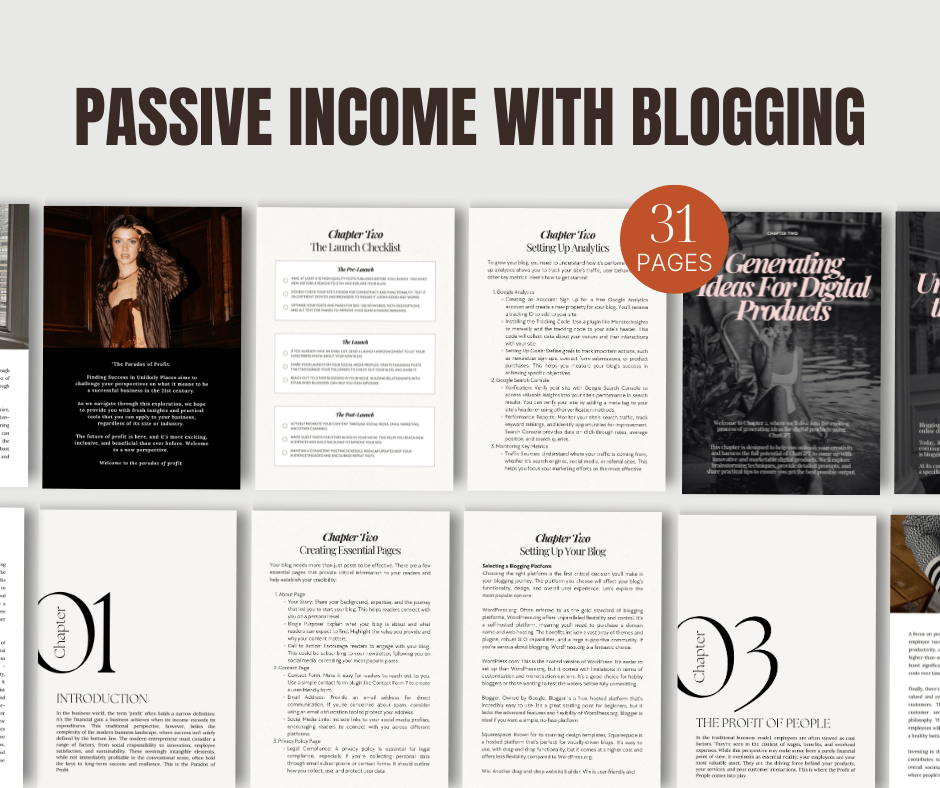3 questions to ask yourself before starting a blog
Starting a blog is one of the best ways to build a brand, share your expertise, and generate passive income. But before diving into details and my two cents on this wonderful world that blogging is, let me share my blogging story a bit. My first blog was a LiveJournal, back in 2004. At that time, I was 23, moving to Canada (I live in the South of France) for a year. Back in the days, there was no Instagram, Facebook and such, and the only two ways I had to stay in touch with my family was Skype AND writing in my LiveJournal. I was doing Mixed Media, sharing my creations, and sharing my journey as a southern French girl living in Montreal. That blog allowed me not only to stay in touch with my family and friends, but it opened SO many doors. I met a Mixed Media community, built a network, and got into Mixed Media and Scrapbooking as an expert and an artist and, 3 years later, I quit my job to become a Mixed Media & Scrapbook teacher and traveled to over 40 countries to teach classes; Pretty cool uh? It all began with a blog :)
That’s me when I used to be a full-time content creator, back in 2013 I think.
I was attending the Alt Summit in Salt Lake City, where I met my girls from Studio Calico. It was probably the BEST life I could ever dream of. And that’s the reason I wanna be a full-time content creator AGAIN ^^
But before you jump in and buy a domain name, there are three critical questions you need to ask yourself. The right questions force us to think differently, challenge our assumptions, and unlock new solutions we never considered.
Most new bloggers make the mistake of diving in without a clear plan. I’m telling you, back in 2004, these were not even questions: I dove in without a strategy. But back in the days, SEO, keywords, branding and online strategies were NOT a thing. So, most bloggers pick a blog name, write a few posts, and hope that somehow, traffic and income will follow. But successful blogging requires strategy, consistency, and the right mindset.
So before you create your blog, take a step back and ask yourself these three powerful questions:
What do I want my blog to be known for?
Most people assume that starting a blog means writing about everything they’re interested in, but that can actually hold you back. One of the biggest mistakes new bloggers make is being too broad. You might feel tempted to write about fitness, travel, mindset, money, business, and personal growth all in one blog. But the truth is, nobody follows a blog that talks about everything (unless you’ve been blogging for over a decade and have a team and now your blog is more like an online magazine with a team dedicated to creating content)
Take a step back and ask yourself: “If someone were to describe my blog in one sentence, what would I want them to say?”
This question forces you to define your niche. Instead of being a generalist, think about how you can specialize and provide unique value.
Why niching down is important
Having a clear niche allows you to:
Attract a loyal audience who knows exactly what to expect from you
Stand out in a crowded online space
Establish yourself as an authority on a specific topic
Make it easier to monetize your blog
Example: Instead of starting a general travel blog, focus on a niche like “solo travel for women” or “budget travel for digital nomads.”
How to choose your blog niche
To define your niche, ask yourself these questions:
What topics am I passionate about? (What could I talk about for hours?)
What am I knowledgeable about? (What do people ask me for advice on?)
What problems can I solve for others? (How can I help people?)
Is there an audience for this topic? (Are people searching for this information online?)
Are there monetization opportunities? (Can I sell products, services, or affiliate offers in this niche?)
What to do next: Pick one clear topic that aligns with your expertise, passion, and audience needs.
How will my blog make money?
A lot of times, people start blogging with the assumption that “if I get enough traffic, I’ll make money.” But that’s not always the case. Of course, it works this way but when traffic = income, that means you have thousands of visitors and your income is based on ad revenue.
Many bloggers spend months (or even years) creating content without having a plan for monetization—and then wonder why their blog isn’t making money. Instead, ask yourself:
“If I had 1,000 visitors tomorrow, what would they buy from me?”
This question shifts your focus from just creating content to building a revenue-generating blog from day one.
Different ways to monetize a blog
Affiliate Marketing
Recommending products you love and earning a commission when someone purchases through your link. Affiliate Marketing has always been my pet peeve. As long as I can remember, I’ve recommended products I use and love on my blog and social media. Whether it was scrapbook products or tools I use for my marketing, affiliate marketing has always worked for me. Why? Because I share tools, products, services I use and love. For example, I’ve been using this planner for years and blogged numerous times about it. And guess what? I earned over $2K in commissions in just a couple of months.
Example: If you run a food blog, you could promote kitchen tools, meal delivery services, or recipe books.
Digital products
Selling ebooks, templates, printables, or online courses. Like Affiliate Marketing, I’ve dived into selling digital products: I sold scrapbook classes online, whether they were videos or PDF’s, I even launched an online course platform back in 2013 where numerous artists were creating content to teach. This “popular” way of sharing knowledge, expertise and art, in that exemple, has grown sooooo much these last couple of years that you CANNOT today avoid considering this passive income.
Example: A social media expert blogger could sell “The Ultimate Social Media Marketing Blueprint”(I do) or “The Build Your Brand ebook”.
Sponsored posts & advertising
Getting paid by brands to feature their products on your blog. I might have done a couple of those back in the days when I was on Typepad and my blog was HUGE. I had those ads booked by Scrapbook companies looking for exposure. Nowadays, consider this more like sponsored content rather than display ads (use google Ads for this and when your blog will reach a wider audience, Mediavine).
Example: A travel blogger could partner with airlines or hotels for paid reviews.
Services & Coaching
Offering consulting, coaching, or freelance services. I offer Squarespace webdesign and social media marketing services/coaching but I don’t promote about it. It’s usually word-of-mouth because I have no time to promote or create content around them. But this is definitely something that you can offer on your blog/website.
Example: A fitness blogger could sell one-on-one coaching or custom meal plans.
Choosing the Right Monetization Strategy
To find the best way to make money with your blog, consider:
✔ Your niche: Some niches, like personal finance and health, are easier to monetize than others.
✔ Your audience: If your readers are beginners, they might prefer affordable digital products. If they’re advanced, high-ticket coaching might be better.
✔ Your skills: If you love writing, create an ebook. If you love teaching, create a course.
✅ What to do next: Choose one primary way you want to monetize your blog and focus on creating content that supports that goal.
Am I focused on what actually moves the needle?
We spend so much time worrying about choosing the perfect blog theme, tweaking our logo, or making sure our website looks perfect—when in reality, those things don’t bring in traffic or income. This used to be me. I used to focus on the details, procrastinating the things that actually would make me get an income. Now, I just dive in. It’s still very difficult to embrace imperfection but it’s oh so good to actually DO THE THINGS.
To refocus, ask yourself: “What is the one action I can take today that will bring in more traffic and revenue?”
Here’s my thought (because I was…have been…am…lol): most new bloggers focus on low-impact activities that don’t actually help them grow.
For example:
❌ Spending weeks designing a logo instead of writing content
❌ Checking Google Analytics every day instead of promoting your blog
❌ Posting on Instagram without linking back to your website
Here are some high-impact activities that grow your blog
✔ Writing SEO-optimized blog posts to rank on Google - if you’re using Squarespace, I highly recommend using SeoSpace to improve and boost your SEO
✔ Creating Pinterest pins to drive traffic to your blog - Pinterest is DA bom! I highly recommend this Pinterest course I took and helped boost the traffic on my website
✔ Building an email list from day one - definitely! See the freebies on my homepage? They all lead to an welcome email sequence delivering a freebie. Then, Flodesk - the email marketing tool I use and love - is here to help me nurture my list
✔ Writing guest posts for other sites to get backlinks - this is something I need to implement more
✔ Promoting your blog in Facebook groups - there’s a bunch of very good Facebook groups you can find out there, for sure. Make sure to post as genuinely as possible not to sound salesy.
The Key to Growth: Focus on creating valuable content and driving traffic instead of obsessing over design details.
✅ What to do next: Make a list of 3 tasks that will move your blog forward, and commit to completing them this week.
Your Next Step: Take Action on Your Answers
Breakthroughs don’t come from knowing the answers—they come from acting on them.
If you’re ready to start a blog that actually makes money, I hope you downloaded the freebies I shared above, in this blogpost. And if you’re ready to take the plundge and dive into content creation like I did, here are a couple of useful resources I came up with for you.






